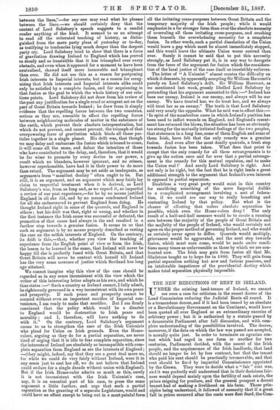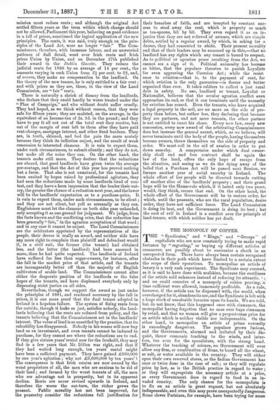THE NEW REDUCTIONS OF RENT IN IRELAND.
TINDER the existing land•tenure of Ireland, we cannot see even a case for criticism in the resent decree of the Land Commission reducing the Judicial Rents all round. It is a tremendous decree, and if it had been issued by an absolute or a Revolutionary Government on the Continent, would have been quoted all over England as an extraordinary exercise of arbitrary power ; but it is authorised by a statute passed by a democratic Parliament after full discussion, and with com- plete understanding of the possibilities involved. The decree, moreover, if the data on which the law was passed are accepted, is morally quite just. In order to terminate an agrarian con- test which had raged in one form or another for two centuries, Parliament decided, with the assent of the Irish people, and the acquiescence of the Irish landlords, that land should no longer be let by free contract, but that the tenant who paid his rent should be practically irremovable, and that rent should be fixed by impartial Commissioners appointed by the Crown. They were to decide what a " fair " rent was, and it was perfectly well understood that in their decisions fair- ness would depend mainly upon the fertility of each estate, the prices reigning for produce, and the general prospect a decent tenant had of making a livelihood on his farm. Those prin- ciples being understood, it followed of necessity that if a great fall in prices occurred after the rents were first fixed, the Com- mission must reduce rents ; and although the original Act settled fifteen years as the term within which change ahould not be allowed, Parliament this year, believing on good evidence in a fall of prices, sanctioned the logical application of the new principles. The rents, it was said, truly enough on the prin- ciples of the Land Act, were no longer "fair." The Com- missioners, therefore, with immense labour, and an unwearied patience of dull detail, went over Irish rents and Irish prices Union by Union, and on December 27th published their award in the Dublin Gazette. They reduce the judicial rents for 1888 by an average of 14 per cent., the amounts varying in each Union from 21. per cent. to 22, and, of course, they make no compensation to the landlord. On the theory of the new tenure, he is only entitled to a fair rent; and with prices as they are, these, in the view of the Land Commission, are " fair " rents.
There is naturally a shriek of dismay from the landlords, who declare that they could hardly be worse treated under the "Plan of Campaign," and who without doubt stiffer cruelly. They had hoped, as we think without reason, that they were safe for fifteen years; they are mulcted, on the average, in the equivalent of an Income-tax of 2s. 9d. in the pound ; and they have to pay it all not out of the total rent they receive, but out of the margin of rent left to them after they have paid rent-charges, mortgage interest, and other fixed burdens. They are, in truth, skinned, and feel the pain the more acutely because they think its infliction unjust, and the result of weak concession to interested clamour. It is vain to expect them, under such circumstances, to submit silently ; and they do not, but make all the noise they can. On the other hand, the tenants make still more. They declare that the reductions are absurd, that good landlords have given twice the average per-tentage, and that the Act of this year has proved nothing but a farce. That also is not unnatural, for the tenants had been excited by hopes raised by professional agitators, they had seen the reductions made by some landlords tired of con- test, and they have a keen impression that the louder their out- cry, the greater the chance of a reduction next year, and the lower will be the landlords' expectation as to a purchase-price. It is vain to expect them, under such circumstances, to be silent ; and they are not silent, but yell as screamily as they can. Englishmen must let the clamour on both sides pass unheeded, only accepting it as one ground for judgment. We judge, from the facts known and the conflicting cries, that the reduction has been generally " fair," in the agrarian acceptation of that word ; and in any case it cannot be unjust. The Land Commissioners are the arbitrators appointed by the representatives of the people, their decree is really an award, and neither side have any more right to complain than plaintiff and defendant would if, in a civil snit, the former (the tenant) had obtained less, and the latter (the landlord) had been amerced in more, than he had quite expected. The landlords of Ireland have suffered far less than sugar-owners, for instance, after the fall in the market price of that article, and the tenants are incomparably better off than the majority of English cultivators of arable land. The Commissioners cannot alter either the desperate position of the landlords or the false hopes of the tenants, and have displeased everybody only by dispensing strict justice on all sides.
Nevertheless, though we support the award as just under the principles of 1881, and rendered necessary by the fall in prices, it is one more proof that the dual tenure adopted in Ireland is a hopeless failure. The system of fixing rents from the outside, though it looks ao just, satisfies nobody, the land- lords believing that the rents are reduced from policy, and the tenants believing that the Commissioners act in the landlords' interest. The value of land is so unsettled by the practice, that its saleability has disappeared. Nobody in his senses will now buy land as an investment, and even tenants cannot be induced to purchase, for they cannot see where the reductions are to end. If they give sixteen years' rental now for the freehold, they may find in a few years that Mr. Dillon was right, and that if they had waited long enough, ten years' rental might have been a sufficient payment. They have gained £360,000 by one year's agitation ; why not .£3,600,000 by ten years' ? The consequence is that Irish estates are now owned by the worst proprietors of all, the men who are anxious to be rid of their land ; and farmed by the worst tenants of all, the men who see advantage not in prosperity, but in its apparent decline. Rents are never revised upwards in Ireland, and therefore the worse the out-turn, the richer grows the peasant. Public morality has not been improved, for the peasantry consider the reductions full justification for
their breaches of faith, and are tempted by constant suc- cess to steal away the rent, which is property as much as tea-spoons, bit by bit. They even regard it as an in- justice that they are not relieved of arrears, which are simple debts, settled by a regular award, by which, in asking for a decree, they had consented to abide. Their present morality and that of their leaders may be summed up in this,—that no landlord has any rights which any tenant is bound to respect. As to political or agrarian peace resulting from the Act, we cannot see a sign of it. Political animosity has become so bitter, that the populace threaten to punish Loyalists for even approving the Coercion Act ; while the resist ance to eviction—that is, to the payment of rent, for which eviction is the only guarantee—is fiercer and better organised than ever. It takes soldiers to collect a just rural debt in safety. No one, landlord or tenant, Loyalist or Nationalist, believes that the secular agrarian conflict even approaches its end, or that it can terminate until the necessity for eviction has ceased. Even the tenants, who have acquired a legal property in the soil, are no more on the side of pro- perty than before, but rather lees, they declaring that because they are partners, and not mere tenants, the other partner is not entitled to exact his share. Every new law, every new concession, every new award of the arbitrating Commissioners does but increase the general unrest, which, as we believe, will never terminate until the body of the people, having themselves become owners, throw themselves on the side of property and order. We must call in the aid of avarice in order to put down anarchy. A compromise under which dual owner- ship shall end and free contract shall be again the law of the land, offers the only hope of escape from the situation, and seeing as we do the dying away of the belief that a Purchase Act will be passed next Session, we foresee another year of social anarchy in Ireland. The whole effort of her people will be directed towards cutting off another slice of the landlords' property ; and their grand hope will be the Home-rule which, if it lasted only two years, would, they think, secure that end. On the other hand, the whole effort of the Government will be to restore order, for which, until the peasants, who are the rural population, desire order, they have not sufficient force. The Land Commission is doing its best, and the Government is doing its best ; but the root of evil in Ireland is a conflict over the principle of land-tenure, with which neither has yet dealt.







































 Previous page
Previous page